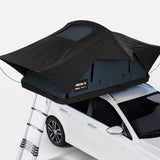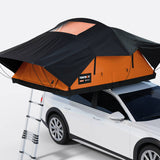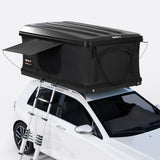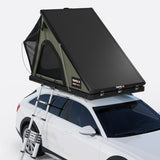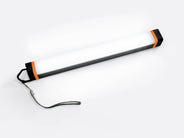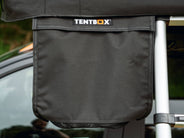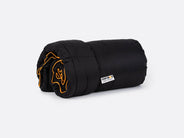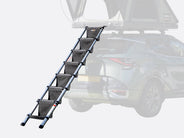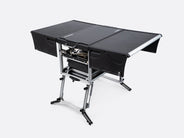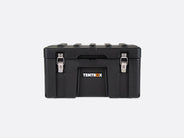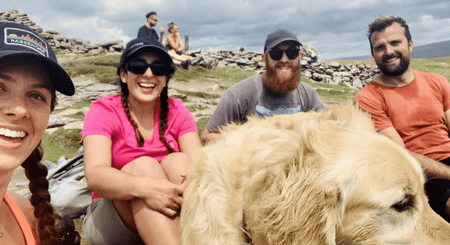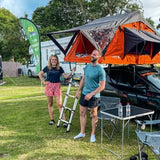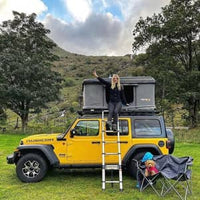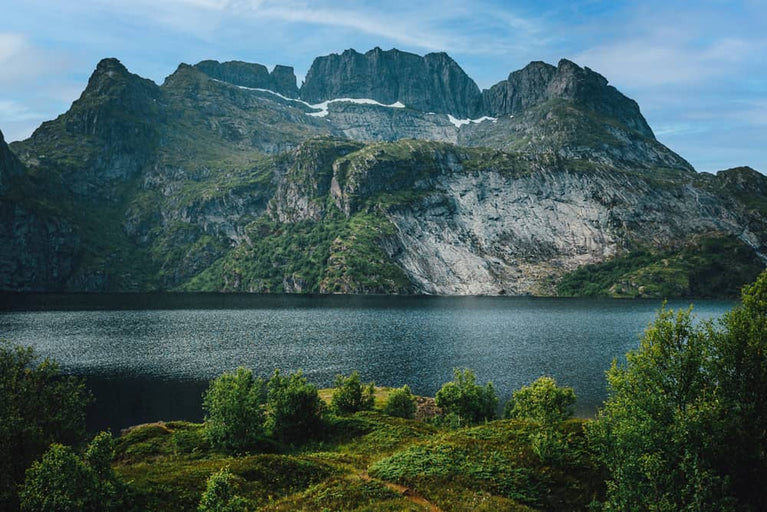4 Fantastic Places To Pitch Your Tentbox
We love to keep in touch with the TentBox community and gather their tips and tricks for the best places to stay and how to travel well with TentBox. This article was written in collaboration with TentBox ambassador, Janire, who is a travel blogger based in Shropshire.
She loves writing about camping, the outdoors and adventure travel. Her blog posts have been featured by Acacia Africa, Nearly Wild Camping and The Travel Cult and she regularly discusses the perks of having a TentBox and shares her tips. Check out her Instagram account @rayofsun_adventures for some fantastic travel inspiration or read on for some of her top tips.
Here’s what she had to say about the best places to pitch your TentBox…
Best Places To Stay With A Rooftop Tent
Camping in any form is fricking awesome if you ask me! It provides a break from the routines of modern life and a chance to reconnect with nature and those we chose to camp with. There’s something primitive and magical about watching the sunset and the stars come out, whilst storytelling with loved ones around the campfire.
With Staycations the most likely holiday most of us will be having this year, and hotel/B&B prices soaring, camping is a great option for those of us who don’t want to spend our life-long savings on a getaway. Whether you have a hammock, tent, campervan or rooftop tent, the key is finding an epic location to pitch up.
As an ambassador for TentBox, the main question I’ve been asked is “where do you pitch up?” Since getting my TentBox Lite I have tried lots of different locations. So here is my little guide to 4 fantastic options of where to pitch your TentBox (or any other kind of tent/van) with examples of some of my experiences to help you decide…..
Campsites
Traditional campsites are excellent social hubs and a great way of meeting new people and making friends. They tend to have a great sense of community with fellow campers often helping each other out and children going off to play together. I recently completed the Yorkshire 3 Peaks challenge with a friend.
We met 2 guys at the campsite and instantly clicked, and spent the night with them, playing cards and cursing the midges by the campfire. We got on so well they ended up doing the Yorkshire 3 Peaks challenge with us and we spent the rest of our time at the campsite together. We made friends with all our camping neighbours there with them showing us their van conversions, camping setups and sharing stories and advice with us before we started the challenge.

When we got back from the gruelling hike and collapsed in a heap on the floor, our new found friends came along with a much needed Budweiser to congratulate us on our efforts. Campsites provide a great base for days out adventuring with a lovely sense of community when you return, so get talking to strangers and you might end up making some great friends!
The added benefit of a traditional campsite is that they tend to have pretty good facilities, so if you couldn’t imagine going camping without being able to shower or straighten your hair, then they are the best option. Most larger campsites also tend to have other facilities such as washing machines, tumble dryers, washing up and indoor cooking, making them feel like a home away from home.
The main con of a traditional campsite is that they tend to be quite busy places in boring, plain fields, so if you’re after a bit of quiet, this is probably not the place for you. That being said I have been to some excellent campsites that are awe-inspiring and quirky, where people keep to themselves. My favourite being Henry’s Campsite on Lizard Point, Cornwall which has a pirate cove feel to it that makes you want to explore to find its hidden gems and say “Arrrr” a lot.
They have a farm animals including Alpacas, a little play ground for younger children and a social area with lots of board games to socialise in. It was the perfect location from which to explore the stunning Lizard Point, Kynance Cove and the Goonhilly satellite station.

Campsites are getting booked up really fast this year and prices increasing. Sites like pitchup.com and coolcamping.com are great but there are many traditional campsites that don’t advertise with these type of sites. Google is your best bet. Find where you want to go, search for local campsites and contact them directly. If they don’t have availability, they often know other campsites in their area and will signpost you to them. Booking this way is often cheaper too. Travelling with a RTT, I always like to call regardless of where I am staying to ensure I am booking the correct pitch and that they are aware of my needs and are able to meet these.
Nearly Wild Camping
Nearly Wild Camping is a growing network of locations ‘willing to host campers (in tents, hammocks, campervans or roof top tents) who are looking for a wilder, secluded or quieter camping experience’. There are over 150 locations across the UK in very different environments including by lakes, in forests, on clifftops and by beaches, with most locations allowing campfires/BBQs. They provide campers with a safe and secure location to enjoy a wilder camping experience at a price. Many locations also offer additional experiences such as bushcraft, bee keeping, pottery and fishing amongst others. With all this in mind, I had to try it out for myself!
I went on a solo adventure with my TentBox to North Wales where I stayed at 2 different Nearly Wild Campsites. I am a usually a very sociable person, so for me solo adventures are a fairly new thing. I have found solace in solitude throughout the Covid19 pandemic and healing in nature and hiking, but the thought of wild camping in my car on my own did give me quite a lot of anxiety. Nearly Wild Camping for me, was a great way to help me overcome this anxiety and grow confidence in being able to go on wild camping adventures in my car, on my own in the future.
My first campsite was in Anglesey at a Bee Keeping farm. I had the place to myself and parked up in their newly planted Bee friendly forest. The site offered fresh drinking water but not toilet or shower facilities due to them being built at that time. They had a large area of land dedicated to people who want to Nearly Wild camp and the lakeside area, I was told, had been really popular with hammock campers. They provided Bee Keeping courses and experiences and showed me their bees telling me all about their importance and how to become more bee friendly.

I had sheep, wild rabbits and birds for neighbours that night and sat out enjoying the evening until dusk. It was an incredibly peaceful night. I had my roof top tent all to myself for once which was great too as I could spread eagle. I made the most of my location to explore Anglesey including the stunning Newborough Beach and Bryn Celli Ddu, a 5000 year old neolithic burial chamber that was nearby.
My second night was at a Nearly Wild camp site on the Hafod Elwy National Nature Reserve. I had a great drive through the Ogwen Valley to get to it. This site was fairly busy with lots of campers, however due to the site being so big, everyone was dotted around with plenty privacy and space to themselves, so it did feel quite secluded. I had a perfect spot for my roof top tent with great views out to the nature reserve. I explored the site that offered Shepherd Huts to campers should they need. These were cool little huts that were completely empty inside but would offer protection against the elements in a storm for instance. There were hammock campers, families with children in large tents, groups of friends in wild camping tents and campervans. This camp provided toilets, showers and drinking water.
It was a great base to explore the Alwen reservoir and Llyn Brenig, so I went for a little adventure into the forest and got some stunning views. Despite the drizzly weather, it was a perfect weekend of peace, exploring and solo adventures.
I have since also stayed at a Nearly Wild Campsite in Cornwall during a weeklong road trip with my mama and son in my TentBox. We were the only ones camping on a large clifftop field and had the most incredible views of the sea. This site provided drinking water and a compost toilet with some pretty incredible views. Hey! We were the only ones there so no need to shut the door! Check out the incredible sunset and sunrise we got there!


Staying with friends and family
A great way to explore is stay with friends and family on their land. As you get talking to people as a TentBoxer you will find that many people live in remote areas where they have land, or can point you in the right direction of where to stay.
One occasion I stayed at one of my best friend’s families farm in the Peak District. An incredibly kind offer that I couldn’t refuse. I stayed by an old barn and had the most incredible sunrise view in the morning and was lucky enough to have access to a hot shower and a kitchen! This gave me a great base for 2 days of exploring. My first day I went on a solo 13 mile/20km hike encompassing Lud’s Church, The Roaches, Hen Cloud and the Three Shires. It was incredible! On my second day I went for a hike with my best friend around the Manifold Valley and visited the instagram famous Thor’s Cave (definitely worth a visit, get there early though!)
On another occasion I stayed at a friend’s friends farm by the River Dee in Wales. I had no facilities there but was quite happy to have a wash in the river in the morning overlooked by sheep and Alpacas! It was peaceful and beautiful with some great views of the Welsh hills. I took that opportunity to visit Llangollen and hike up to Castell Dinas Bran and along the Panorama walk.
So get talking and networking! You might be surprised at the options that open up to you that way. Tentbox and RTT camping is a great little community and you might get some other fantastic ideas of where to pitch just by talking to people on Facebook pages. Bring on the Tentbox campout on 3rd-5th September at Black Rock Sands where we can all do just that! YAY!!
Home is where you pitch it! I personally like to mix it up a bit and stay at different types of locations depending on what I am doing. Wherever you camp make sure you enjoy the beauty of nature and all she has to offer you and treat her with respect. Remember to camp responsibly and ensure you follow the ‘Leave No Trace’ principles so we can all be happy campers and have ongoing access to the great British outdoors.
